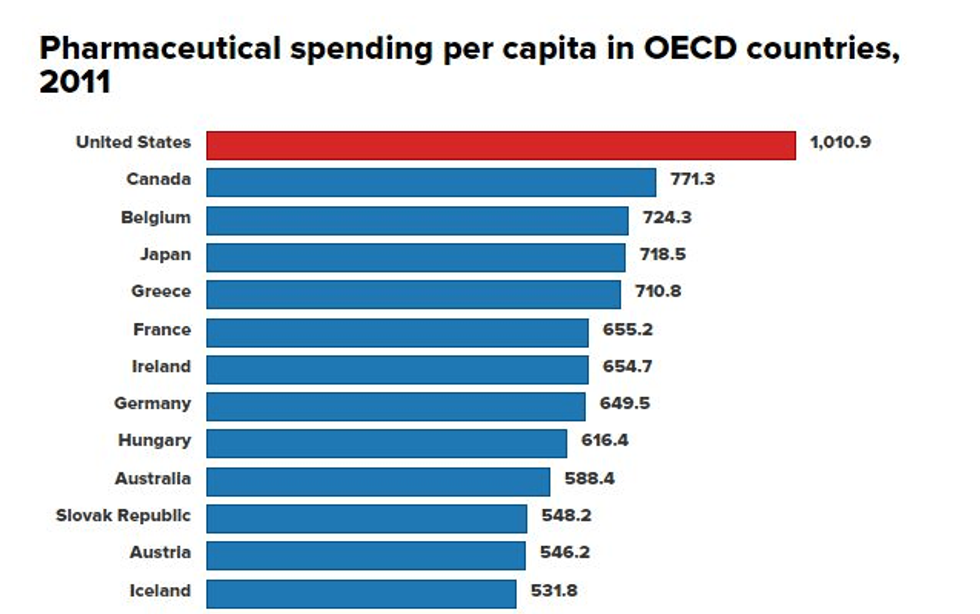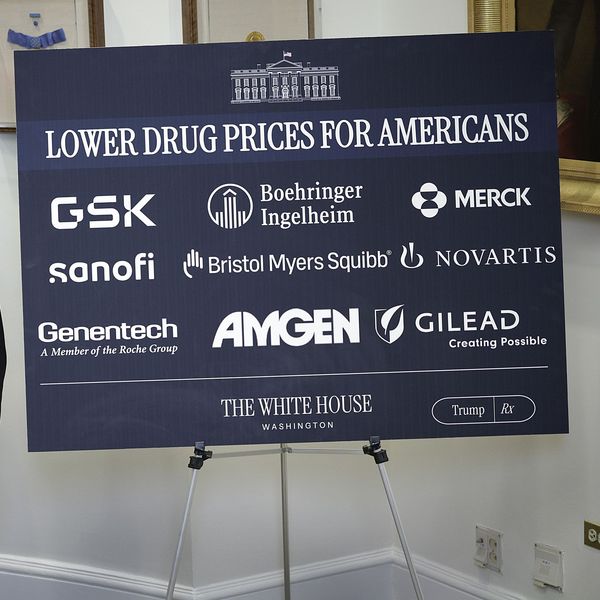
Sen. Bernie Sanders (I-VT), ranking Democrat on the Senate Budget Committee, speaks at a news conference. (Photo by Win McNamee/Getty Images)
Sanders Takes on Pharma Greed With Rule to End 'Price Gouging'
"Sanofi and the rest of the pharmaceutical industry cannot be allowed to make huge profits on the backs of working class Americans."
In a move characterized as an effort to prevent large pharmaceutical companies from "goug[ing] American consumers after taking billions in taxpayer money," Sen. Bernie Sanders (I-Vt.) on Monday introduced a new rule that would require drugmakers to agree to set reasonable prices before being granted exclusive rights to produce vaccines and other life-saving drugs.
"Americans should not be forced to pay the highest prices in the world for a vaccine we spent more than $1 billion to help develop."
--Sen Bernie SandersSanders was joined by Rep. Peter DeFazio (D-Ore.) in crafting and unveiling the rule, which the pair of lawmakers "first proposed two decades ago with bipartisan support." The rule currently has 21 co-sponsors.
In the face of new developments, Sanders said in a statement, a rule addressing soaring prescription drug prices is as necessary as ever.
While the new rule would have broad implications, Sanders specifically takes aim at Sanofi, a French pharmaceutical giant that the U.S. Army has offered an exclusive license to develop a vaccine for the Zika virus.
"American taxpayers have already spent more than $1 billion on Zika research and prevention efforts, including millions to develop a vaccine. The Department of Health and Human Services gave Sanofi $43 million to develop the vaccine with $130 million in federal funding still to come," Sanders' office said in a statement. "But Sanofi has refused to agree to sell the drug back to Americans at a fair price. Without a fair pricing agreement, the company can charge Americans whatever astronomical price it wants for its vaccine."
Sanders, who spent much of his 2016 presidential campaign railing against the greed of the pharmaceutical industry, called such an arrangement "simply unacceptable."
"Americans should not be forced to pay the highest prices in the world for a vaccine we spent more than $1 billion to help develop," Sanders said. "Sanofi gets more than one-third of its roughly $34 billion in revenues from the United States alone, and its CEO made nearly $5 million in salary last year. Yet they have rejected the U.S. Army's request for fair pricing."
Sanders continued:
Sanofi and the rest of the pharmaceutical industry cannot be allowed to make huge profits on the backs of working class Americans, many of whom cannot afford the medication they are prescribed. The days of allowing Sanofi and other drug makers to gouge American consumers after taking billions in taxpayer money must end. That is why I am introducing legislation to demand fairer, lower prices for the Zika vaccine and for every drug developed with government resources. This is a fight that we cannot afford to lose.
An analysis (PDF) of the rule by the Congressional Budget Office found that the rule would save the federal government $6 billion over the next decade.
As Sanders often points out, the United States spends far more on pharmaceutical drugs--and on healthcare more broadly--than other industrialized nations.

An Urgent Message From Our Co-Founder
Dear Common Dreams reader, The U.S. is on a fast track to authoritarianism like nothing I've ever seen. Meanwhile, corporate news outlets are utterly capitulating to Trump, twisting their coverage to avoid drawing his ire while lining up to stuff cash in his pockets. That's why I believe that Common Dreams is doing the best and most consequential reporting that we've ever done. Our small but mighty team is a progressive reporting powerhouse, covering the news every day that the corporate media never will. Our mission has always been simple: To inform. To inspire. And to ignite change for the common good. Now here's the key piece that I want all our readers to understand: None of this would be possible without your financial support. That's not just some fundraising cliche. It's the absolute and literal truth. We don't accept corporate advertising and never will. We don't have a paywall because we don't think people should be blocked from critical news based on their ability to pay. Everything we do is funded by the donations of readers like you. Will you donate now to help power the nonprofit, independent reporting of Common Dreams? Thank you for being a vital member of our community. Together, we can keep independent journalism alive when it’s needed most. - Craig Brown, Co-founder |
In a move characterized as an effort to prevent large pharmaceutical companies from "goug[ing] American consumers after taking billions in taxpayer money," Sen. Bernie Sanders (I-Vt.) on Monday introduced a new rule that would require drugmakers to agree to set reasonable prices before being granted exclusive rights to produce vaccines and other life-saving drugs.
"Americans should not be forced to pay the highest prices in the world for a vaccine we spent more than $1 billion to help develop."
--Sen Bernie SandersSanders was joined by Rep. Peter DeFazio (D-Ore.) in crafting and unveiling the rule, which the pair of lawmakers "first proposed two decades ago with bipartisan support." The rule currently has 21 co-sponsors.
In the face of new developments, Sanders said in a statement, a rule addressing soaring prescription drug prices is as necessary as ever.
While the new rule would have broad implications, Sanders specifically takes aim at Sanofi, a French pharmaceutical giant that the U.S. Army has offered an exclusive license to develop a vaccine for the Zika virus.
"American taxpayers have already spent more than $1 billion on Zika research and prevention efforts, including millions to develop a vaccine. The Department of Health and Human Services gave Sanofi $43 million to develop the vaccine with $130 million in federal funding still to come," Sanders' office said in a statement. "But Sanofi has refused to agree to sell the drug back to Americans at a fair price. Without a fair pricing agreement, the company can charge Americans whatever astronomical price it wants for its vaccine."
Sanders, who spent much of his 2016 presidential campaign railing against the greed of the pharmaceutical industry, called such an arrangement "simply unacceptable."
"Americans should not be forced to pay the highest prices in the world for a vaccine we spent more than $1 billion to help develop," Sanders said. "Sanofi gets more than one-third of its roughly $34 billion in revenues from the United States alone, and its CEO made nearly $5 million in salary last year. Yet they have rejected the U.S. Army's request for fair pricing."
Sanders continued:
Sanofi and the rest of the pharmaceutical industry cannot be allowed to make huge profits on the backs of working class Americans, many of whom cannot afford the medication they are prescribed. The days of allowing Sanofi and other drug makers to gouge American consumers after taking billions in taxpayer money must end. That is why I am introducing legislation to demand fairer, lower prices for the Zika vaccine and for every drug developed with government resources. This is a fight that we cannot afford to lose.
An analysis (PDF) of the rule by the Congressional Budget Office found that the rule would save the federal government $6 billion over the next decade.
As Sanders often points out, the United States spends far more on pharmaceutical drugs--and on healthcare more broadly--than other industrialized nations.

In a move characterized as an effort to prevent large pharmaceutical companies from "goug[ing] American consumers after taking billions in taxpayer money," Sen. Bernie Sanders (I-Vt.) on Monday introduced a new rule that would require drugmakers to agree to set reasonable prices before being granted exclusive rights to produce vaccines and other life-saving drugs.
"Americans should not be forced to pay the highest prices in the world for a vaccine we spent more than $1 billion to help develop."
--Sen Bernie SandersSanders was joined by Rep. Peter DeFazio (D-Ore.) in crafting and unveiling the rule, which the pair of lawmakers "first proposed two decades ago with bipartisan support." The rule currently has 21 co-sponsors.
In the face of new developments, Sanders said in a statement, a rule addressing soaring prescription drug prices is as necessary as ever.
While the new rule would have broad implications, Sanders specifically takes aim at Sanofi, a French pharmaceutical giant that the U.S. Army has offered an exclusive license to develop a vaccine for the Zika virus.
"American taxpayers have already spent more than $1 billion on Zika research and prevention efforts, including millions to develop a vaccine. The Department of Health and Human Services gave Sanofi $43 million to develop the vaccine with $130 million in federal funding still to come," Sanders' office said in a statement. "But Sanofi has refused to agree to sell the drug back to Americans at a fair price. Without a fair pricing agreement, the company can charge Americans whatever astronomical price it wants for its vaccine."
Sanders, who spent much of his 2016 presidential campaign railing against the greed of the pharmaceutical industry, called such an arrangement "simply unacceptable."
"Americans should not be forced to pay the highest prices in the world for a vaccine we spent more than $1 billion to help develop," Sanders said. "Sanofi gets more than one-third of its roughly $34 billion in revenues from the United States alone, and its CEO made nearly $5 million in salary last year. Yet they have rejected the U.S. Army's request for fair pricing."
Sanders continued:
Sanofi and the rest of the pharmaceutical industry cannot be allowed to make huge profits on the backs of working class Americans, many of whom cannot afford the medication they are prescribed. The days of allowing Sanofi and other drug makers to gouge American consumers after taking billions in taxpayer money must end. That is why I am introducing legislation to demand fairer, lower prices for the Zika vaccine and for every drug developed with government resources. This is a fight that we cannot afford to lose.
An analysis (PDF) of the rule by the Congressional Budget Office found that the rule would save the federal government $6 billion over the next decade.
As Sanders often points out, the United States spends far more on pharmaceutical drugs--and on healthcare more broadly--than other industrialized nations.


